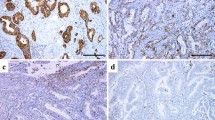Abstract
Background
Gemcitabine is a promising adjuvant treatment for patients with resected pancreatic cancer. Human equilibrative nucleoside transporter-1 (hENT1) is the major transporter responsible for gemcitabine uptake into cells. The aim of this study was to retrospectively determine the relationship between the outcome of pancreatic cancer after surgery followed by postoperative gemcitabine monotherapy and the expression of hENT1.
Methods
A total of 27 resected pancreatic cancer patients treated with adjuvant gemcitabine were analyzed for tumor hENT1 expression via an immunohistochemical analysis. The staining intensity and the percentage of positive tumor cells were scored, and the composite score (hENT1 score) was obtained by obtaining the sum of these two scores.
Results
There were 11 patients assigned to the low hENT1 expression group, and 16 patients to the high hENT1 group. The patients with tumors that had higher hENT1 expression had a significantly longer disease-free survival (DFS) (log rank, P = 0.022) and overall survival (OS) (P = 0.024). The hENT1 expression was indicated to be a significant and independent prognostic factor for OS by the univariate (P = 0.030) and multivariate analyses (P = 0.019).
Conclusions
A high expression of hENT1 in pancreatic cancer was found to be significantly associated with a longer survival in patients who received adjuvant gemcitabine monotherapy after curative resection, and hENT1 immunohistochemistry may well serve as a significant prognostic factor for these patients.


Similar content being viewed by others

References
Katz MH, Fleming JB, Lee JE, Pisters PW. Current status of adjuvant therapy for pancreatic cancer. Oncologist. 2010;15:1205–13.
Oettle H, Post S, Neuhaus P, Gellert K, Langrehr J, Ridwelski K, et al. Adjuvant chemotherapy with gemcitabine vs observation in patients undergoing curative-intent resection of pancreatic cancer: a randomized controlled trial. JAMA. 2007;297:267–77.
Neuhaus P, Riess H, Post S. Final results of the randomized, prospective, multicenter phase three trial of adjuvant chemotherapy with gemcitabine versus observation in patients with resected pancreatic cancer. J Clin Oncol. 2008;26(15 suppl):LBA4504.
Regine WF, Winter KA, Abrams RA, Safran H, Hoffman JP, Konski A, et al. Fluorouracil vs gemcitabine chemotherapy before and after fluorouracil-based chemoradiation following resection of pancreatic adenocarcinoma: a randomized controlled trial. JAMA. 2008;299:1019–26.
Neoptolemos JP, Stocken DD, Bassi C, Ghaneh P, Cunningham D, Goldstein D, et al. Adjuvant chemotherapy with fluorouracil plus folinic acid vs gemcitabine following pancreatic cancer resection: a randomized controlled trial. JAMA. 2010;304:1073–81.
Mackey JR, Mani RS, Selner M, Mowles D, Young JD, Belt JA, et al. Functional nucleoside transporters are required for gemcitabine influx and manifestation of toxicity in cancer cell lines. Cancer Res. 1998;58:4349–57.
Garcia-Manteiga J, Molina-Arcas M, Casado FJ, Mazo A, Pastor-Anglada M. Nucleoside transporter profiles in human pancreatic cancer cells: role of hCNT1 in 2′,2′-difluorodeoxycytidine- induced cytotoxicity. Clin Cancer Res. 2003;9:5000–8.
Damaraju VL, Damaraju S, Young JD, Baldwin SA, Mackey J, Sawyer MB, et al.: Nucleoside anticancer drugs: the role of nucleoside transporters in resistance to cancer chemotherapy. Oncogene. 2003;22:7524–36.
Giovannetti E, Del Tacca M, Mey V, Funel N, Nannizzi S, Ricci S, et al. Transcription analysis of human equilibrative nucleoside transporter-1 predicts survival in pancreas cancer patients treated with gemcitabine. Cancer Res. 2006;66:3928–35.
Spratlin J, Sangha R, Glubrecht D, Dabbagh L, Young JD, Dumontet C, et al. The absence of human equilibrative nucleoside transporter 1 is associated with reduced survival in patients with gemcitabine-treated pancreas adenocarcinoma. Clin Cancer Res. 2004;10:6956–61.
Farrell JJ, Elsaleh H, Garcia M, Lai R, Ammar A, Regine WF, et al. Human equilibrative nucleoside transporter 1 levels predict response to gemcitabine in patients with pancreatic cancer. Gastroenterology. 2009;136:187–95.
Marechal R, Mackey JR, Lai R, Demetter P, Peeters M, Polus M, et al. Human equilibrative nucleoside transporter 1 and human concentrative nucleoside transporter 3 predict survival after adjuvant gemcitabine therapy in resected pancreatic adenocarcinoma. Clin Cancer Res. 2009;15:2913–9.
Mackey JR, Jennings LL, Clarke ML, Santos CL, Dabbagh L, Vsianska M, et al. Immunohistochemical variation of human equilibrative nucleoside transporter 1 protein in primary breast cancers. Clin Cancer Res. 2002;8:110–6.
Acknowledgment
This study was partially supported by grants from Kanagawa Prefectural Hospitals Cancer Fund. The authors declare that they have no potential conflict of interest.
Author information
Authors and Affiliations
Corresponding author
Rights and permissions
About this article
Cite this article
Morinaga, S., Nakamura, Y., Watanabe, T. et al. Immunohistochemical Analysis of Human Equilibrative Nucleoside Transporter-1 (hENT1) Predicts Survival in Resected Pancreatic Cancer Patients Treated with Adjuvant Gemcitabine Monotherapy. Ann Surg Oncol 19 (Suppl 3), 558–564 (2012). https://doi.org/10.1245/s10434-011-2054-z
Received:
Published:
Issue Date:
DOI: https://doi.org/10.1245/s10434-011-2054-z



